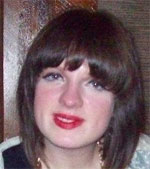Q&A with JDF recipients Alexandra Rucki
Alexandra Rucki is currently working as an online journalist at the London Evening Standard. Find out more about Alexandra’s passion for journalism, her training, life as a journalist and how the Journalism Diversity Fund helped her career.
 Alexandra Rucki is currently working as an online journalist at the London Evening Standard, having previously been a reporter at the Wandsworth Guardian. Find out more about Alexandra’s passion for journalism, her training, life as a journalist and how the Journalism Diversity Fund helped her career.
Alexandra Rucki is currently working as an online journalist at the London Evening Standard, having previously been a reporter at the Wandsworth Guardian. Find out more about Alexandra’s passion for journalism, her training, life as a journalist and how the Journalism Diversity Fund helped her career.
Why did you want to become a journalist?
I have always known I wanted to be a writer and used to invent my own newspapers and magazines when I was little. I got my first proper taste of journalism when I started my undergraduate degree course. I wrote for the student newspaper in my spare time and my first story was about students attacking a taxi driver which made the front page. I enjoyed speaking to a variety of people, piecing the story together and working to a deadline. I quickly realised it is the kind of job where you get to meet a lot of different people. I liked the idea of being a set of eyes and ears for the public.
What were you doing before your journalism training?
I was in my final year of an English Literature course at the University of Sheffield. I was editing the student website forgetoday.com alongside my studies, writing for an arts blog and doing work experience during my holidays.
Did you have journalism related work experience before you applied to the Journalism Diversity Fund?
Yes. I was web editor of forgetoday.com; I did work experience with the news agency Cavendish Press, covering courts and news in Manchester; I did a placement at my local newspaper the Sale Messenger; I wrote music and arts reviews for CityLife, a Manchester Evening News entertainment website; I was blogging for arts website arts.info; and I did some PR work experience for the Manchester International Festival.
What help did you receive from the fund?
My course fees were paid for and I also received a contribution towards my living costs. The Journalism Diversity Fund intern was also really helpful with giving me contacts for my work experience. I managed to arrange a week at the Independent on Sunday with thanks to the fund.
How did you find your course?
I studied the MA in Print Journalism at the University of Sheffield. The course was great and I was really thrown into the deep-end. It was useful for preparing me for the newsroom – getting my own news-patch and being taught how to deal with breaking news when I was the only person on the news-desk. It was hard work and I can remember not having much of a social life during that time in my life, but it all paid off.
What advice would you give to someone who wants to pursue a career in journalism?
Get in as much work experience as you can and make the most of it. There could be a job going in a few months time and you might set a good enough impression for the editor to remember you. I used to take cakes in on my last day which went down a treat.
Don’t be knocked back by job rejections and keep trying. I had about nine interviews before I was hired and each time I asked for feedback to find out where I was going wrong. Build your contacts from work experience placements and people you meet, you never know when they will come in useful.
What diversity do you bring to the newsroom?
I’m from a working-class, single-parent family and the first of my family to go to university. I did not have a clue what an MA was before I went to university, and very proud to now have the title under my belt. I think as most newspapers now expect trainees to have completed a journalism course, only the more well-off can afford further qualifications to become a journalist so there are less people like myself in the newsroom. I also have dyspraxia and don’t think you come across many journalists with a learning difficulty.
What are you currently doing and what do you love most about your job?
I’m currently working as an online journalist for the London Evening Standard. It’s an exciting time to be working for the Standard, as they have just launched a TV station and expanding their digital operation. My role involves keeping the website up to date with breaking news, enhancing web content to maximise hits and editing the homepage when I’m on a late or evening shift. I really enjoy the buzz of breaking news and being the first person to report on a story.It’s exciting to find out thousands of people have read my story and are sharing it on social media.
How did you find completing the NQJ?
I felt very proud when I passed the NQJ as it did take me two attempts. My newsroom said all the best reporters fail first so I will stick by that motto!
It was hard work but I certainly felt well versed enough in media law to fight a Section 39 order in court a few weeks after passing, and managed to get it lifted.

